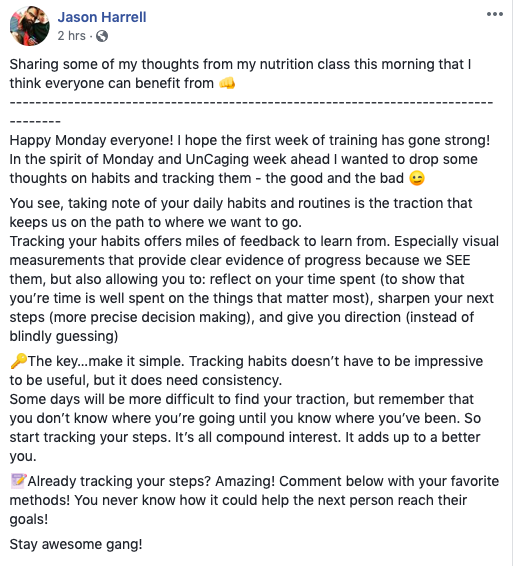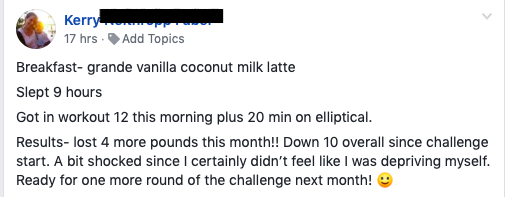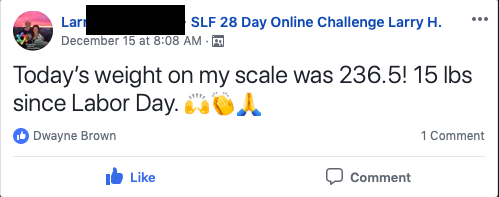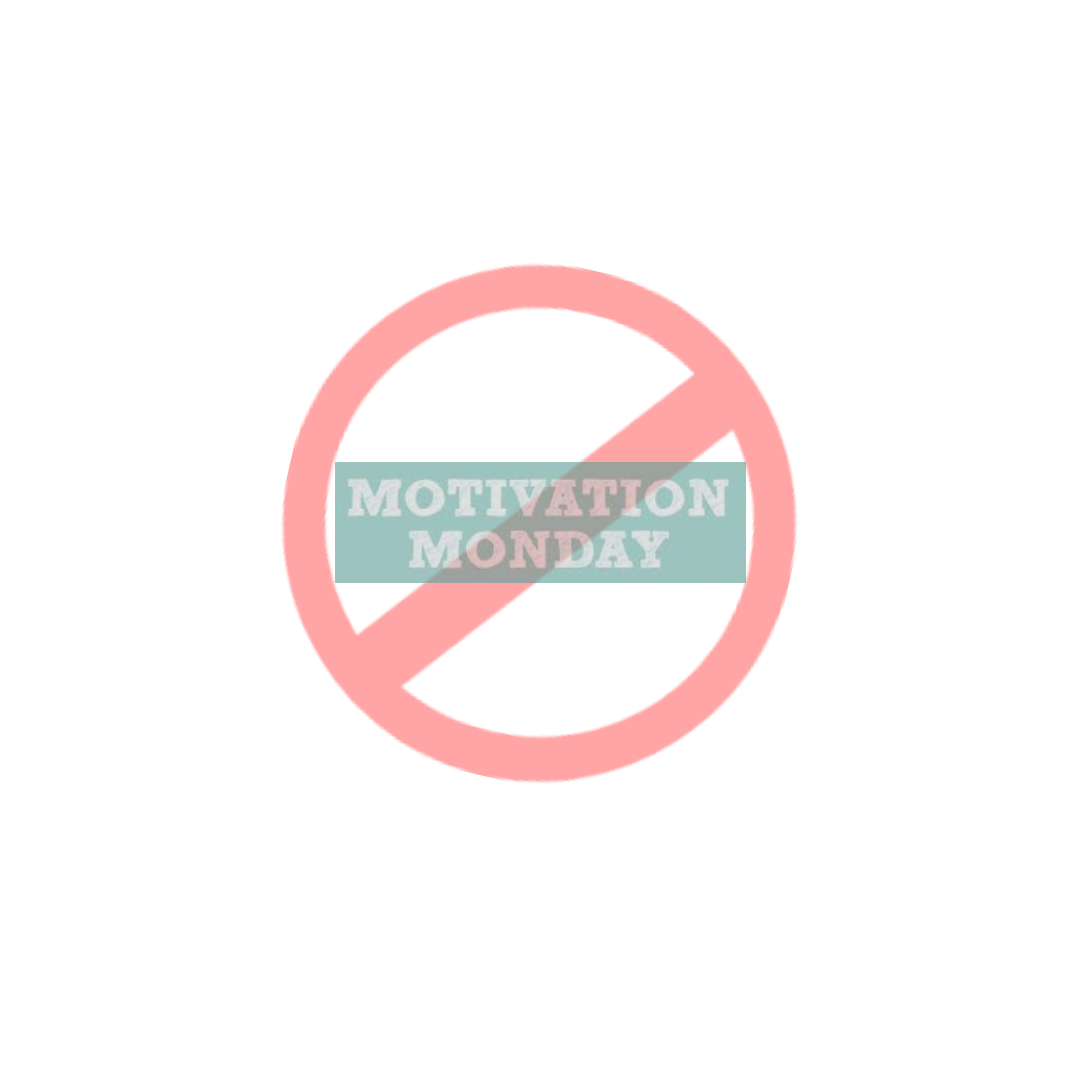Let's talk about expectations.
We all have them and they can be very motivating.The motivations of expectations are where the problems lie, especially when it comes to health and fitness. You would think that something that motivates someone would be a good thing. Normally it is. The problem is motivation built on false expectation ends up becoming demotivating.
Bare with me here.
When it comes to fitness and losing weight we often hear things like "drink this tea or wear this wrap and lose up 20lbs in a month." There is absolutely nothing true about that statement. Again, to be clear, there are no teas or wraps that will make you lose weight. This sets is a false expectation.
If you didn't know any better (which you now do) that would sound like a awesome deal. Who wouldn't want to lose 20 pounds? In a month no less. See super motivating.
Until you don't lose the weight. Then you're like what happened. You drank all the tea. You drank it exactly when they told you to drink it. You only lost 8 pounds. That's no where near 20. Now you're thinking why'd you even bother? Not so motivated anymore right?
Here's the thing though: 8 pounds is a great and very sustainable amount of weight to lose in a month. It should be celebrated. It would've been celebrated if the expectation wasn't 20 pounds. The false expectation turned success into failure. That sucks.
(By the way, the made-up person above didn't lose weight because of tea. They lost weight because they ate less and exercised/moved more. For God's sake, teas don't make you lose weight.)
Whenever you're ready... here are 3 ways I can help you reach your health & fitness goals
1. Join My 28 Day Online Fitness ChallengeNext challenge begins June 3rd. You'll get daily accountability, nutrition plans and even a FREE cookbook. These challenges run once a month. If you want in just reply to this email and say challenge.
2. Work with me One-on-OneIf you're in Brooklyn or Manhattan you can schedule a complimentary training session in which we'll outline your goals and lay out the plan to help you reach those goals.
3. Grab a free copy of my e-book, Fitness 101: Get Started Lifting now.Use the book to learn all the equipment you'll find in the gym, how to use that equipment and all the exercises that you'll ever need to know. Let me know if you want it and I'll get you a copy.




 There a lot of gems in this status. Jason mentions how tracking is the key toward maintaining progress and will help with decision making. He also mentions tracking includes tracking both the good and bad habits. This is super important because people tend to forget that progress is not only doing more good stuff but also (and sometimes firstly) doing less bad stuff.I mention this as I'm about to start another 28 Day Online Fitness challenge a week from today. The type of habit tracking that Jason is talking about is the backbone of the challenge. There are two things members of the challenge must do everyday: they must post a picture of everything they eat and they must post a daily gratitude post. The challenge basically works to instill these two habits on a daily basis.Sure there are personal nutrition plans and workouts and lots of info given throughout the challenge. That being said though, the people who get the best results from the challenge are the ones who adhere to posting their food pics and getting their gratitude posts up everyday. It's almost too simple for some people. Often at the beginning of the challenge I have to get people to concentrate on doing just those two things before they start trying to do too much.Since I brought up results. Let's talk about some of the results that people have gotten from the challenge. The most obvious one is weight loss. I've seen people lose 5-12lbs during the challenge. The great thing about this weight loss is that I can say that everyone who has lost weight has kept that weight off months later. I attribute this to learning how to track and maintain good habits.Some other results challenge members have seen are clothes fitting better, strength and energy increases, improved time management and increased confidence among other things. I might be more proud of these results than the weight loss (good news for me is that they usually come together). Particularly when people start talking about getting stronger and once again doing things they used to do regularly. Or when people mention they finally bought a new piece of clothing that they hadn't been comfortable buying before. These things really get me in the feels.This next round of the challenge begins on the 22nd and goes through May 19th. This will give you the chance to head into Memorial Day and summer having developed life changing habits and feeling like your best self. Intrigued? Fill out the quick form below and I'll get back to you ASAP.[contact-form][contact-field label="Name" type="name" required="1" /][contact-field label="Email" type="email" required="1" /][contact-field label="What do you want to get out of the challenge?" type="textarea" required="1" /][/contact-form]
There a lot of gems in this status. Jason mentions how tracking is the key toward maintaining progress and will help with decision making. He also mentions tracking includes tracking both the good and bad habits. This is super important because people tend to forget that progress is not only doing more good stuff but also (and sometimes firstly) doing less bad stuff.I mention this as I'm about to start another 28 Day Online Fitness challenge a week from today. The type of habit tracking that Jason is talking about is the backbone of the challenge. There are two things members of the challenge must do everyday: they must post a picture of everything they eat and they must post a daily gratitude post. The challenge basically works to instill these two habits on a daily basis.Sure there are personal nutrition plans and workouts and lots of info given throughout the challenge. That being said though, the people who get the best results from the challenge are the ones who adhere to posting their food pics and getting their gratitude posts up everyday. It's almost too simple for some people. Often at the beginning of the challenge I have to get people to concentrate on doing just those two things before they start trying to do too much.Since I brought up results. Let's talk about some of the results that people have gotten from the challenge. The most obvious one is weight loss. I've seen people lose 5-12lbs during the challenge. The great thing about this weight loss is that I can say that everyone who has lost weight has kept that weight off months later. I attribute this to learning how to track and maintain good habits.Some other results challenge members have seen are clothes fitting better, strength and energy increases, improved time management and increased confidence among other things. I might be more proud of these results than the weight loss (good news for me is that they usually come together). Particularly when people start talking about getting stronger and once again doing things they used to do regularly. Or when people mention they finally bought a new piece of clothing that they hadn't been comfortable buying before. These things really get me in the feels.This next round of the challenge begins on the 22nd and goes through May 19th. This will give you the chance to head into Memorial Day and summer having developed life changing habits and feeling like your best self. Intrigued? Fill out the quick form below and I'll get back to you ASAP.[contact-form][contact-field label="Name" type="name" required="1" /][contact-field label="Email" type="email" required="1" /][contact-field label="What do you want to get out of the challenge?" type="textarea" required="1" /][/contact-form]

 If you spend any time on any social media platform on any Monday then you'll #motivationmonday posts. They are usually quotes or pictures of people/animals doing extraordinary things. Their goal is to give you the extra push you need to get out there and get shit done. They are dumb.
If you spend any time on any social media platform on any Monday then you'll #motivationmonday posts. They are usually quotes or pictures of people/animals doing extraordinary things. Their goal is to give you the extra push you need to get out there and get shit done. They are dumb.